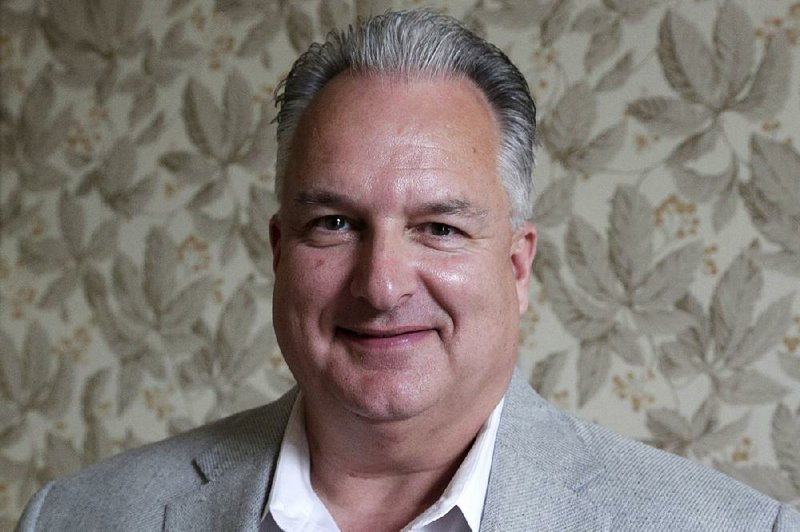Attorney General Leslie Rutledge's office said a "conflict of interest" has forced her staff to stop representing state Treasurer Dennis Milligan and his chief of staff, Jim Harris, in a defamation lawsuit filed by the treasurer's former outreach manager, David Singer.
The defendants have retained Byron Freeland of the Mitchell, Williams, Selig, Gates & Woodyard PLLC law firm to represent Milligan and Harris, according to Milligan's records.
Officials with the attorney general's office and the state treasurer's office declined Tuesday to reveal the nature of the conflict.
Milligan spokesman Grant Wallace said Freeland has been hired based on his experience and expertise in these types of legal matters. So far, the treasurer's office has paid the Mitchell law firm $20,000, Wallace said.
Senior Assistant Attorney General C. Joseph Cordi Jr. told Milligan and Harris in a June 29 letter that "a conflict of interest prevents the Office of Attorney General from continuing to represent you, in either your individual or official capacities" in Singer's lawsuit.
"This conflict exists because recently discovered circumstances impede this Office's ability to effectively develop and present certain defenses and arguments on your behalf," Cordi wrote in the letter released by Milligan's office Tuesday.
"We therefore decline to further represent you pursuant to Ark. Code Ann. 21-9-203(b) and authorize you to hire special counsel," Cordi said in his letter.
Rutledge's office had represented Harris since the lawsuit was filed nearly two months ago, and Milligan since he was added to the lawsuit during the first week of June.
The June 29 letter is dated a week after Luther Sutter -- an attorney representing Singer -- notified Pulaski County Circuit Judge Wendell Griffen that mediation between the parties had failed. Sutter requested that Griffen consider his motion for a preliminary injunction that would grant a "name-clearing hearing" for Singer.
Freeland notified Griffen in a July 2 court filing that the lawsuit has been moved to the U.S. District Court for the Eastern District of Arkansas, Western Division.
Freeland said he wants the lawsuit in federal court because the legal issues that Singer has raised are federal matters, such as the request for a name-clearing hearing. Lucien Gillham, another attorney representing Singer, said Singer should have a name-clearing hearing under both the state and federal constitutions, and he doesn't care whether the lawsuit is in state or federal court.
Rutledge spokesman Judd Deere said he was "not in a position to offer comment" on why none of the attorneys in the attorney general's office are able to represent a state constitutional officer and his chief of staff.
Rutledge declined to answer questions about the recusal. Deere later reiterated that "the Attorney General or this office is not in a position to comment."
Milligan also declined requests for comment.
Wallace said that "the treasurer is referring all questions regarding this lawsuit to his attorney, Mr. Freeland, based upon his attorney's advice and considering this is an ongoing legal matter."
Freeland said it's unclear whether there'll be an actual conflict of interest.
Freeland said that there might be a conflict in the attorney general's office because one of the assistant attorneys general may testify in the case, adding that "that's not uncommon."
He said he doesn't remember the person's name, but he doesn't believe the assistant attorney general works at Rutledge's office anymore.
Freeland said the assistant attorney general could be called to testify by either side in Singer's lawsuit against Milligan and Harris.
"It may never happen, but it's a threat," he said.
Gillham said he doesn't know what conflict of interest exists on the part of the attorney general's office.
"There could be an issue that I am not aware of," he said.
In a letter dated June 30, Freeland told Milligan and Harris that he can represent both men because they've indicated that there is "no material adversity or conflict of interest between yourselves."
"So long as that is the case, we will be happy to represent all of you jointly," Freeland wrote. "In the event of material adversity or conflict of interest, it is likely that we will not be able to continue the joint representation and we may have to withdraw from further representation of any of the jointly represented clients."
Freeland wrote that he will have primary responsibility for representing Milligan and Harris and that his hourly rate is $275.
He said he expects that one of his partners, Kathlyn Graves, is likely to be "principally involved," and her hourly rate is $265.
Freeland wrote that lawyers at his firm "strive to provide services at the lowest practical rate level."
He also said that the treasurer's office has agreed to pay a $20,000 retainer.
Singer was hired by Milligan in mid-January at a salary of $65,000 per year to do outreach for the treasurer's office.
Singer said Harris was the one who told him he'd been fired, but he didn't receive any explanation for the dismissal. He filed suit against Harris on May 28.
According to Singer's court complaint, Singer's wife died in June 2014 after a long fight with breast cancer and that while he grieved, Harris talked about Singer's dead wife in "a disgusting manner."
Singer's suit claimed that Harris told people, including journalists, that Singer suffered from "mental problems" and accused him of using his wife's death to make "sexual advances toward other women."
Seeking both compensatory and punitive damages as well as legal fees, Singer added Milligan to the lawsuit June 5 in both a personal and professional capacity. He has requested a jury trial.
Singer's amended complaint accused Milligan of firing him because Milligan thought Singer was "mentally ill" and that just before his termination, he'd spoken out against the use of public funds for political activities, which Sutter said is protected by the Arkansas Whistleblower Act.
After the complaint was amended, Milligan said that Singer's accusations were "untrue."
In addition to the lawsuit, Milligan has faced allegations that his deputy chief of staff, Jason Brady, improperly used a nonprofit charity's resources during Milligan's 2014 campaign.
Brady worked for the American Cancer Society Cancer Action Network in 2013 and 2014 while also sending out campaign-related emails for Milligan during work hours in violation of the charity's policies.
When the allegations surfaced in late April, Milligan said he and Brady would make a donation to the cancer group to compensate it for any costs resulting from Brady's campaign work.
The group said it received the donations in early June, but on June 9 said it was returning the money.
In March, Milligan agreed to pay Rutledge's office a $1,000 penalty for violating the state's nepotism law when he hired his cousin for a job at the treasurer's office.
He also reimbursed the state $6,941.62 for the pay earned by his cousin, Sam Swayze, while he was on the state payroll.
On May 31, the Jefferson County Republican Committee called for Milligan's resignation, and its chairman, Peter Smykla Jr., said Milligan's behavior amounted to a "betrayal of our confidence and trust."
Metro on 07/15/2015


